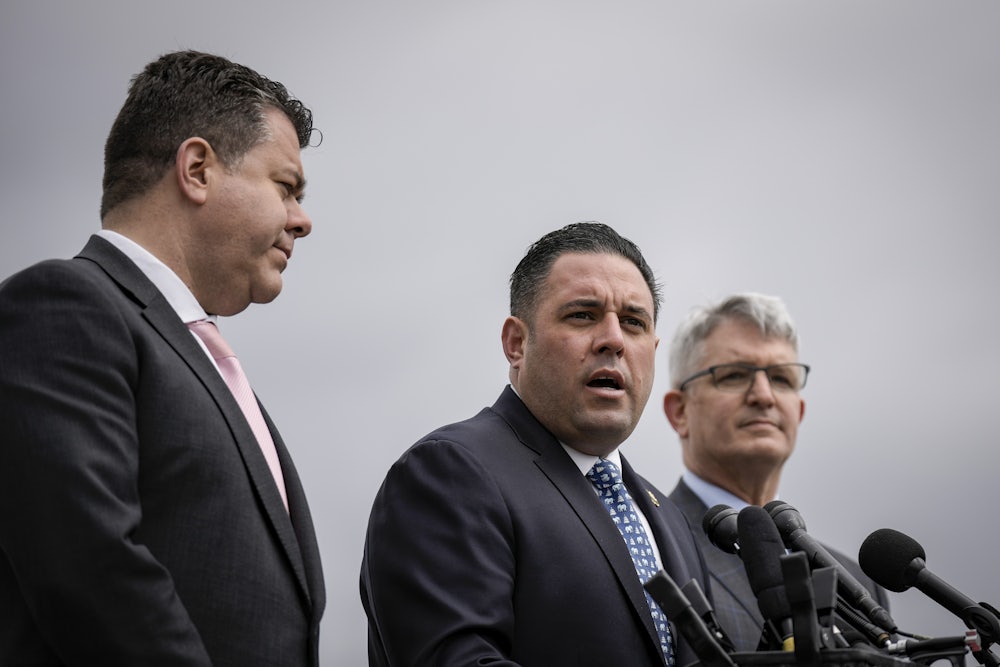When Congressman Anthony D’Esposito joined all but four House Republicans in passing the GOP debt limit increase proposal last week, he further marked himself as being among a group of Republicans he’d probably rather not be a part of. D’Esposito is one of 18 House Republicans who voted for the bill who represent districts that President Biden won in 2020, many of them by wide margins—in D’Esposito’s case, by nearly 17 points. He and the other Republicans in these districts were in Democrats’ campaign crosshairs before the vote. But now Democrats are even more optimistic that these Republicans can be replaced in 2024.
That’s because the debt limit increase bill they voted on included provisions that would be politically toxic for a House Republican tenuously representing a Democratic-leaning district. The proposal they voted for did raise the debt ceiling through next year but also includes a whopping $131 billion in cuts to discretionary domestic spending. Those cuts hit Biden’s Inflation Reduction Act and expansive spending for the environment, health care, and taxes.
Specifically, the bill would cap discretionary spending at $1.47 trillion over the next fiscal year and let that spending grow only 1 percent each year after. But this, says the White House, would really amount to a 22 percent spending cut across a wide range of popular domestic programs. The proposal includes additional work requirements for recipients of food stamps and those who receive health insurance through the federal government. Such people would have to work more hours than before to receive those benefits. The proposal also makes it more difficult for states to exempt families from requirements to receive Supplemental Nutrition Assistance Program benefits. Overall this is a proposal that fulfills Republicans’ dreams of making it harder for a portion of Americans who need government assistance to actually get it.
In voting for this bill, the Biden-district Republicans who already face a narrow path to winning reelection will face an even narrower path. Take Congressman David Valadao’s district in California. Biden beat Donald Trump in that district by 13 percentage points in the last presidential election. Or Congressman Mike Lawler in New York’s 17th congressional district. Biden won that district by 10 points. Before Lawler, Democrats had represented the 17th district going all the way back to Guy Molinari in 1983. That’s a district that is ripe to flip back to Democrats under the right conditions.
“I think the challenge for being a Republican in a frontline race or a highly vulnerable Republican this election is anything that you do that only crystallizes your MAGA standing amongst the party in a district that is likely to vote for Joe Biden just increases your likelihood of not going back to Washington,” said Democratic strategist Dan Sena, a former executive director of House Democrats’ campaign arm. “The benefits that the David Valadaos, the Don Bacons have had in the past is that they have always been able to make the case that there is something else about them; there is something about their voting record that makes them less MAGA and more moderate.”
I surveyed half a dozen Democrats since the vote, asking how important this would be for these Republicans and which of them was the most vulnerable. The strategists I talked with, many of them specialists on House campaigns or alumni of the Democrats’ congressional campaign arm, were hesitant to pick just one or two of these races as standouts. Instead, most agreed that any of these Republicans, from California or New York especially, were on notice. That would be John Duarte (California’s 13th district), Valadao, Mike Garcia (California’s 27th), Young Kim (California’s 40th), Michelle Steele (California’s 45th), Nick LaLota (New York’s 1st district), George Santos (New York’s 3rd, who of course has a whole other set of problems), D’Esposito, Lawler, Brandon Williams (New York’s 22nd), and Marc Molinaro (New York’s 19th). If one were to simply go by Biden’s margin of victory in these 18 districts, you’d add Lori Chavez-DeRemer of Oregon to that list. Biden won her 5th district by nearly double digits.
“Trying to defend this bill in swing districts is nearly impossible for these Republican incumbents,” said Democratic strategist Jesse Ferguson. “They’ve positioned themselves as both pro-default and against the middle class at the same time. It’s quite a feat. There’s a story for Democrats to tell about how Republicans refused to pass a bill that would just avoid default and instead passed a bill that gutted the middle class.”
Democrats had already been hammering these Biden-district Republicans on aspects of the cuts in the debt limit proposal. The Democratic-aligned advocacy group House Majority Forward has run TV ads hitting Republicans for being prepared to “let America default.” Democratic campaign committees, allied super PACs as well as outside consultants and strategists, expect these attacks to continue. And Democrats have polling to show they are effective. According to a Public Policy Polling survey conducted for House Majority Forward, 60 percent of those surveyed “strongly disapprove” when asked their opinion of the cuts.
Republicans have struggled to address the cuts in the debt limit increase bill, even as they stand by their vote for it. Garcia, for instance, told Roll Call that Democrats were pushing a “false narrative” that Republicans voted for cutting domestic spending programs (they are not).
“The more Democratic the district, the more incentive there is to make a break from party orthodoxy for these votes,” said Democratic pollster Brian Stryker. “So being a really partisan Republican in an R+3 district isn’t as bad as a D+1 or D+7.” Unfortunately for these Republicans, these districts are the latter.
What the debt ceiling vote really did is offer the latest example of how Republicans choose to stick with party orthodoxy and Donald Trump even in the face of strong incentives on policy—say, the potential default of the U.S. Treasury—to do otherwise. For many members of the House Republican caucus, there’s little pain to be had from doing that. But for a select bunch, following the short-term party goals increases the long-term chance of electoral defeat. Democrats already feel they have a chance to retake the House next fall. Depending on how the debt fight concludes, these votes raise the odds that the House flips.






